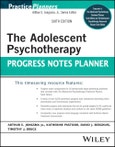Save hours of time-consuming paperwork with the bestselling planning system for mental health professionals
The Adolescent Psychotherapy Progress Notes Planner, Sixth Edition, provides more than 1,000 complete prewritten session and patient descriptions for each behvioral problem in The Adolescent Psychotherapy Treatment Planner, Sixth Edition. Each customizable note can be quickly adapted to fit the needs of particular client or treatment situation.
An indispensable resource for psychologists, therapists, counselors, social workers, psychiatrists, and other mental health professionals working with adolescent clients, The Adolescent Psychotherapy Progresss Notes Planner, Sixth Edition:
- Provides over 1,000 prewritten progress notes describing client presentation and interventions implemented
- Covers a range of treatment options that correspond with the behavioral problems and current DSM-TR diagnostic categories in the corresponding Adolesecent Psychotherapy Treatment Planner
- Incorporates DSM-5 TR specifiers and progress notes language consistent with evidence-based treatment interventions
- Addresses more than 35 behaviorally based presenting problems, including social anxiety, suicidal ideation, conduct disorder, chemical dependence, bipolar disorder, low self-esteem, ADHD, eating disorders, and unipolar depression
- Includes sample progress notes that satisfy the requirements of most third-party payors and accrediting agencies, including JCOA, CARF, and NCQA
- Features new and updated information on the role of evidence-based practice in progress notes writing and the status of progress notes under HIPAA
Table of Contents
Practiceplanners® Series Preface ix
Progress Notes Introduction 1
Academic Underachievement 3
Adoption 21
Anger Control Problems 35
Anxiety 52
Attention- Deficit/Hyperactivity Disorder (ADHD) 66
Autism Spectrum Disorder 83
Bipolar Disorder 98
Blended Family 112
Bullying/Aggression Perpetrator 125
Bullying/Aggression Victim 140
Conduct Disorder/Delinquency 155
Depression - Unipolar 172
Divorce Reaction 190
Eating Disorder 209
Gender Dysphoria 225
Grief/Loss Unresolved 238
Intellectual Disability 253
Loneliness 271
Low Self- Esteem 285
Medical Condition 299
Negative Peer Influences 314
Obsessive- Compulsive Disorder (OCD) 330
Opioid Use Disorder 343
Oppositional Defiant Disorder 359
Overweight/Obesity 373
Panic/Agoraphobia 386
Parenting 398
Peer/Sibling Conflict 414
Physical/Emotional Abuse Victim 427
Posttraumatic Stress Disorder (PTSD) 443
Schizophrenia Spectrum 459
Runaway 471
Sexual Abuse Perpetrator 486
Sexual Abuse Victim 503
Sexual Orientation Confusion 521
Sexual Promiscuity 533
Sleep Disturbance 545
Social Anxiety 557
Specific Phobia 571
Substance Use 583
Suicidal Ideation 599a







